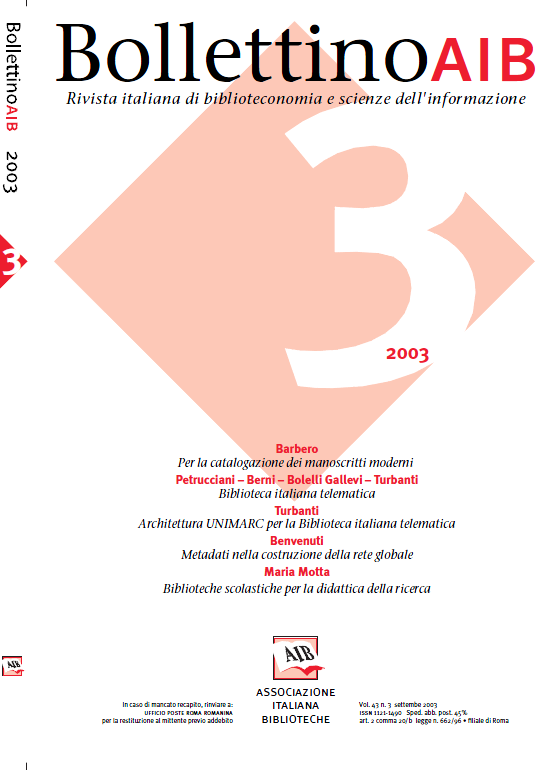The importance of metadata in the construction of the global network
Main Article Content
Abstract
This text has been written further to the International Conference of the Dublin Core Management Initiative (DCMI) 2002, held in Florence (Italy) in october 2002 to inform italian librarians about scope, results and applications of the most common metadata scheme. The article reports on the main themes tackled in the various section of the Conference such as keynotes (speakers: De Sompel about OAI and Openurl, E. Miller, about the semantic Web, S. Weibel, about DCMI), tutorials and the proceedings of the conference.
An important issue concerned the function of Dublin Core, frequently considered as alternative to the traditional MARC cataloguing and not as a format to meet the problem of interoperability between traditional book collections and new types and formats of information objects.
The article retraces the debate on the function of metadata and outlines the project of semantic Web supported by W3C. The function of Extensible Markup Language (XML) as meta-language for creating user oriented metadata and the role of "namespace" as formal declaration on the net of metadata schemes is described, as well as the proposed way to establish semantic relationships between resources and to express ontologies through the Resource description framework (RDF).
The role of the DC as pidgin language to achieve interoperability between metadata formats is presented together with DC elements, their vocabularies and refinements rules. Reference is made to the different structure and function of the existing metadata schemes from the automatic matadata created by search engines through DC up to complex schemes like TEI, EAD or MARC21.
The activity of DCMI to maintain the position of the DC in the professional information community as the most used scheme is illustrated characterising his organisation as a light, open and collaborative environment. The article addresses also the adaptation strategy of the DCMI to make different languages and metadata schemes interoperable, focusing on the role of application profiles as a mean to meet different user requirements in changing frameworks.
The work of the interest groups within DCMI is also examined: the Registry group intended for promoting the public registration of semantic and the reuse of elements from different domains; the Architecture group that licensed prescriptions for expressing DC in HTML, XML, RDF; the Library group that created the library profile for multiple use, as well as the Agent group that is actually working on the refinement of the creator element. The Administrative metadata group concentrates on the core set for the administrative metadata, while the Collection group deals with collection level description, a main task for digital libraries and knowledge organisations. Brief reports on the activity of the Education group, E-governments group, Citation group etc. are given.
The article on the whole focuses on the opportunity to operate in the open, collaborative environment facilitated by DCMI for extending the role and function of the libraries and building efficient interoperable information systems.
An important issue concerned the function of Dublin Core, frequently considered as alternative to the traditional MARC cataloguing and not as a format to meet the problem of interoperability between traditional book collections and new types and formats of information objects.
The article retraces the debate on the function of metadata and outlines the project of semantic Web supported by W3C. The function of Extensible Markup Language (XML) as meta-language for creating user oriented metadata and the role of "namespace" as formal declaration on the net of metadata schemes is described, as well as the proposed way to establish semantic relationships between resources and to express ontologies through the Resource description framework (RDF).
The role of the DC as pidgin language to achieve interoperability between metadata formats is presented together with DC elements, their vocabularies and refinements rules. Reference is made to the different structure and function of the existing metadata schemes from the automatic matadata created by search engines through DC up to complex schemes like TEI, EAD or MARC21.
The activity of DCMI to maintain the position of the DC in the professional information community as the most used scheme is illustrated characterising his organisation as a light, open and collaborative environment. The article addresses also the adaptation strategy of the DCMI to make different languages and metadata schemes interoperable, focusing on the role of application profiles as a mean to meet different user requirements in changing frameworks.
The work of the interest groups within DCMI is also examined: the Registry group intended for promoting the public registration of semantic and the reuse of elements from different domains; the Architecture group that licensed prescriptions for expressing DC in HTML, XML, RDF; the Library group that created the library profile for multiple use, as well as the Agent group that is actually working on the refinement of the creator element. The Administrative metadata group concentrates on the core set for the administrative metadata, while the Collection group deals with collection level description, a main task for digital libraries and knowledge organisations. Brief reports on the activity of the Education group, E-governments group, Citation group etc. are given.
The article on the whole focuses on the opportunity to operate in the open, collaborative environment facilitated by DCMI for extending the role and function of the libraries and building efficient interoperable information systems.
Article Details
Section
Articles

This work is licensed under a Creative Commons Attribution-ShareAlike 4.0 International License.
